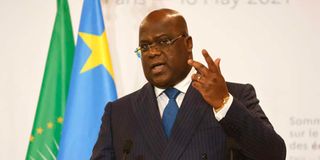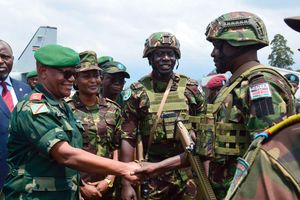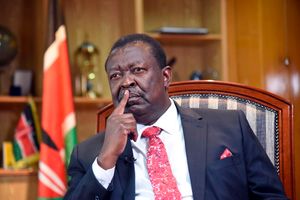
President of Congo Democratic Republic Felix Tshisekedi.
Congolese voters are now waiting for the spinning coin after the National Independent Electoral Commission (Ceni) started to count ballots to determine who of the 26 candidates won the presidency.
Exit projections have signalled a victory for President Felix Tshisekedi. Eight candidates pulled out of the race to either back him or opposition heavyweight Moise Katumbi. Whatever happens in the vote count, assuming it is fair, the next DRC president, expected to be announced on January 10, 2024, by the Constitutional Court, will face an immediate challenge to righting many wrongs and rebuilding the economy and bridges with Congo’s neighbours.
The new president will still face the task of building the economy and removing DRC from the list of the top five poorest nations in the world.
The cost of living has increased and the country relies heavily on imports of basic foodstuff. The depreciation of the Congolese franc has pushed up inflation, which surged to 23 per cent year-on-year in July 2023, according to the IMF.
Tshisekedi negotiated a $1.5 billion programme with the IMF in July 2021, the first since the IMF broke ties with Kinshasa in 2012 under Tshisekedi’s predecessor Joseph Kabila, Reuters reported in November.
More than 26 million people require humanitarian assistance, in part because of rampant insecurity, data from the United Nations’ International Organisation for Migration show.
In 2022, nearly 62 per cent of Congolese, around 60 million people, lived on less than $2.15 a day. About one out of six people living in extreme poverty in sub-Saharan Africa lives in DRC.
After peaking at 8.9 per cent in 2022, real GDP growth is expected to reach 6.8 per cent in 2023. The mining sector remains the driver of growth although mining output growth is projected to slow to 11.7 per cent in 2023, from 22.6 per cent in 2022, according to the World Bank.
The current account deficit should remain large, at 4.7 per cent of GDP in 2023, in response to higher import prices and persistent deterioration in the terms of trade. Inflows from external financing are expected to lead to the accumulation of international reserves, estimated to reach 10 weeks of imports in 2023, says the WB.
The DRC is sub-Saharan Africa’s largest country by land size. Of its nine neighbours, it shares borders with five East African Community (EAC) members. In the run-up to the elections, relations with those neighbours seemed stuck in the mud.
Only Burundi seemed to enjoy unfettered access to Kinshasa.
Rwanda remained public enemy number one and Uganda-DRC relations were still marred by old suspicions.
Kenya, which had been seen as a neutral “friend” broke that trust after hosting a group of rebels who gathered in Nairobi and declared intent to kick out the government in Kinshasa. Nairobi has since denounced the group but argued it could not gag free speech and hence could not arrest the group led by former Ceni president Corneille Nangaa, now sanctioned and in exile.
“Kenya is a democracy. We cannot arrest anybody who has issued a statement. We do not arrest people for making statements, we arrest criminals,” President William Ruto said on December 17, when asked during a TV interview.
His Foreign ministry dissociated with the political-military coalition.
But that came after Kinshasa recalled its ambassadors in Nairobi and from Arusha, the headquarters of the EAC.
Kenya under former president Uhuru Kenyatta helped persuade Tshisekedi to join the EAC and Kenyatta was the only head of state who attended Tshisekedi’s inauguration in 2019, even as the West criticised the electoral outcome there.
Kinshasa has since admitted its expectations in the EAC haven’t been met, but officials say they will stay on.
“When we joined the EAC, it was to connect our country with the region. The regional bloc was committed to peacebuilding but unfortunately, we have little progress,” government spokesman and Information and Communication Minister Patrick Muyaya said in Kinshasa on November 2.
They hope to settle conflicts in eastern DRC, where armed groups, including some from neighbouring countries, have roamed for the past two decades.
“Some Congolese are now questioning why we even asked to join the EAC,” Mr Muyaya said but noted the DRC hopes the bloc can work as planned so the region can trade more, at peace.
One reason for Kinshasa’s disappointment is the M23, a rebel group DRC says is sponsored by Rwanda, but Kigali denies this charge. When Kinshasa agreed to have East African Community Regional Forces (EACRF), it hoped the troops could target the rebel group. The mission did not go into combat and Kinshasa kicked them out. The EACRF mandate ended on December 8, with M23 still a threat.
At his final campaign rally on December 18, President Tshisekedi told voters that if Mr Nangaa and his allied M23 grouping kill just one Congolese, he would seek parliamentary approval to launch war on Rwanda.
That may sound like political rhetoric to enchant his voters but DRC has fought with Rwanda before, and the effects are being felt to date, reflecting the risks involved, as wars are usually unpredictable.
After Nangaa launched his Congo River Alliance on December 15, the DRC cited the EAC Treaty tenets to criticise Nairobi.
“I wanted to remind Kenya to stick to the rules and several instruments which bind us, in particular the charter of the community of East African states, which ensures that we cannot attack each other, that we cannot maintain armed groups which destabilise our respective countries,” said Congolese Interior Minister Peter Kazadi in a statement.
The peace process in the DRC is currently steered by Mr Kenyatta through the Nairobi Process, but it is at a standstill at the moment.
Mr Kenyatta did condemn the rebel coalition and its “provocative rhetoric.”
Tshisekedi’s challenge is similar to the one he had in his first term: Bringing peace to Ituri and North and South Kivu, the three restive provinces in eastern DRC.
Nangaa’s is a political and military alliance, bringing together armed groups from North and South Kivu, Maniema, Ituri, Tshopo (the former Eastern Province) and the greater Katanga region. The new alliance includes the M23 and more than 200 politicians in the DRC, according to Nangaa, but he did not name them.
Some analysts have argued the neighbourhood is unsettled by Tshisekedi’s decision to end EACRF mission.
Nicaise Kibel Bel, a military expert based in Kivu, sees the launch of the rebel alliance in Kenya as Nairobi seizing an opportunity “to avenge the shame that the DRC has just inflicted on its contingent, which was expelled like a plague.”
But, apart from the regional force that has just left the DRC, Kenya has bilateral agreements with the Congo, including the latest one signed in August, on military cooperation. This includes training of FARDC, the Congolese military, by the Kenya Army. The first units are already being trained in Kisangani in the northeast.
Uganda and Burundi also have bilateral military cooperation arrangements going on.
Kenya and the DRC have abolished visas for their respective travellers, so has Uganda. They want to facilitate trade and the movement of people. The DRC wants to enhance cooperation with Kenya via the Mombasa port. This offers an opportunity to increase trade with Kenya, through which it imports goods to eastern regions. Kenya has already increased its investment in the banking sector, with Equity Bank and KCB Bank already in the DRC. This economic and commercial rationale, however, banks on security.
Tanzania is another of the DRC’s allies. Its port of Dar es Salaam is pivotal to the Congolese economy, and Kinshasa authorities still remember the Tanzanian troops who contributed to the rapid intervention brigade of the peacekeeping mission in Congo. Tanzania did not deploy troops under EACRF, however.
On this list of allies, Uganda is a partner with whom Congo has joined forces to fight the Islamist rebel group, Allied Democratic Forces (ADF), in North Kivu and Ituri. But many in Congo view this alliance with suspicion.
The Congolese authorities say they trust Uganda. In July 2022, President Tshisekedi sent infrastructure minister Alexis Gisaro President Museveni, to ask for his support in finding a solution to the war against M23. Mr Gisaro told the Ugandan president that it would be “difficult to find a solution” without Uganda’s help.
Economically, the border post between the DRC and Rwanda is one of those with the highest volume of goods traffic. But it only opens for a few hours these days.
The DRC accuses Rwanda of supporting the M23 rebels while Rwanda charges that the DRC is supporting the FDLR rebels.
Additional Reporting by Aggrey Mutambo


